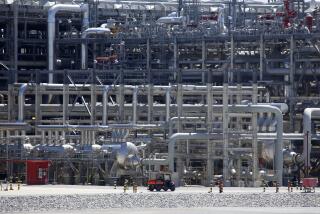U.S. Can’t Let Today’s Oil Glut Determine Tomorrow’s Policy
- Share via
In his column, “Overconfidence Could Revive the Energy Crunch” (Jan. 19), John F. Lawrence is correct in his assertion that the gains from energy conservation and efficiency, both of which played a key role in softening the demand for oil, are often fragile and temporary.
But he overlooks another major factor in creating the current oil glut, one whose effects are longer lasting and more dependable--the displacement of oil by other fuels, chiefly coal-fired and nuclear-generated electricity both here and abroad.
Unfortunately, however, there is a continued decline in planned construction of coal plants in the United States, and the only nuclear plants under construction are those so far along that they cannot be cancelled. This industry has been declared dead, even by many of its supporters.
Absent new construction of non-oil capacity, unexpected increases in electricity demands are apt to be met with oil-fired generation--the large oil burners that make up most of the current electric reserve margin, co-generation (often oil-fired), and small combustion oil--or gas-fired turbines that can be built quickly with little capital outlay.
This is unfortunate. Despite the recent spate of good news about oil prices, few of the basic petrogeological facts have changed since the energy crunch.
In fact, by certain measures, our future supply prospects look darker even now. Lawrence rightly mentions the fact that the developing world’s demand for oil is expected to increase sharply.
Consider several additional facts: There have been no new major oil finds despite increased worldwide exploration activities. We continue to use more oil than we can find.
The United States, Soviet Union and Western Europe are all suffering sharp declines in oil reserves and will have to turn increasingly to imported oil (most likely from the Middle East) to make up the difference.
Clearly, the oil glut has all the earmarks of a temporary condition. It cannot be allowed to become the basis for national energy policy.
MIRO M. TODORVICH
Executive Director
Scientists and Engineers
for Secure Energy, New York
More to Read
Sign up for Essential California
The most important California stories and recommendations in your inbox every morning.
You may occasionally receive promotional content from the Los Angeles Times.













